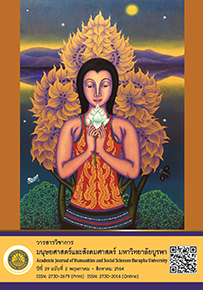Attitudes Toward the Idea of Becoming a “Domestic Goddess” in Duang Jai Thawaprom Novel Series
Main Article Content
Abstract
This article aimed to examine attitudes toward the identity of “domestic goddess” in Duang Jai Thewaprom novel series. The study focused on five novels: La-o Jan (Fair Moon), by Sonklin; Kwan Rutstai (Darling), by Kaotaem; Jai Phisut (Pure Heart), by Praenat; Dut Apsorn (Like an Angel), by Nara; and Phon Chiwan (Life Blessing), by Romkaew. This study identified two attitudes toward the idea of becoming a “domestic goddess.” The first was characterized by adherence to the idea and was held by characters who valued a woman by her abilities to fulfill the role of domestic goddess. These characters could be divided into those who adhered to the idea throughout the novels and those who began with this attitude but adopted a more generous one in the end. The second attitude was characterized by detachment from the idea of becoming a domestic goddess which was held by characters who did not value women based on their ability to fulfill this role, but rather, on other abilities, including those related to their education or career. These characters could also be divided into those who were detached from the idea throughout the novels and those who changed their attitude, ultimately adhering to the idea of women fulfilling the domestic goddess role. The findings from this study are indicative of current trends related to shifting status and gender roles among women.
Downloads
Article Details
บทความทุกบทความเป็นลิขสิทธิ์ของวารสารวิชาการมนุษยศาสตร์และสังคมศาสตร์ มหาวิทยาลัยบูรพาเท่านั้น
References
เก้าแต้ม. (2562). ขวัญฤทัย. กรุงเทพฯ: พิมพ์ดี.
กฤตยา อาชวนิจกุล. (2554). เพศวิถีที่กำลังเปลี่ยนไปในสังคมไทย: Sexuality transition in Thai society ในประชากรและสังคม. กรุงเทพฯ: สถาบันวิจัยประชากรและสังคม มหาวิทยาลัยมหิดล.
จินตนาถ กลัดวัง. (2545). การสร้างความหมาย “ครัว” ในนิตยสารครัวและนิตยสารแม่บ้าน. วิทยานิพนธ์นิเทศศาสตรมหาบัณฑิต, สาขาวิชาวารสารสนเทศ, คณะนิเทศศาสตร์, จุฬาลงกรณ์มหาวิทยาลัย.
ชาติชาย มุกสง. (2558). จากแม่ศรีเรือนถึงแม่บ้านทันสมัย: การต่อสู้ทางศีลธรรมผ่าน แม่บ้านหลังปฏิวัติ 2475 ถึงทศวรรษ 2500. ชุมทางอินโดจีนเอเชียตะวันออกเฉียงใต้ปริทัศน์ มหาวิทยาลัยนเรศวร, 4(7), 95-113.
ซ่อนกลิ่น. (2562). ลออจันทร์. กรุงเทพฯ: พิมพ์ดี.
ณารา. (2562). ดุจอัปสร. กรุงเทพฯ: พิมพ์ดี.
ทัศนีวัลย์ ศรีมันตะ. (2557). อาเซียนและเพศภาวะ: การช่วงชิงพื้นที่การแสดงออกของผู้หญิงในประเทศไทย. วารสารวิจัยเพื่อพัฒนาสังคมและชุมชน มหาวิทยาลัยราชภัฏมหาสารคาม, 1(1), 47-57.
บุญยงค์ เกศเทศ. (2532). สถานภาพสตรีไทย. กรุงเทพฯ: โอเดียนสโตร์.
ปาจารีย์ ช่วยบุญ. (2560). สถานภาพและบทบาทของผู้หญิงในนวนิยายชุดสุภาพบุรุษจุฑาเทพ. วิทยานิพนธ์ศิลปศาสตรมหาบัณฑิต, สาขาวิชาไทยศึกษา, คณะมนุษยศาสตร์, มหาวิทยาลัยรามคำแหง.
ปาจารีย์ ช่วยบุญ. (2561). ภาพสะท้อน “แม่ศรีเรือน” ในนวนิยายชุดสุภาพบุรุษจุฑาเทพ. วารสารมนุษยศาสตร์และสังคมศาสตร์ มหาวิทยาลัยสงขลานครินทร์, 14(1), 117-142.
แพรณัฐ. (2562). ใจพิสุทธิ์. กรุงเทพฯ: พิมพ์ดี.
ร่มแก้ว. (2562). พรชีวัน. กรุงเทพฯ: พิมพ์ดี.
วาลี ขันธุวาร. (2547). วาทกรรมผู้หญิงไทยกับความแปรเปลี่ยน. วารสารมนุษยศาสตร์สังคมศาสตร์ มหาวิทยาลัยขอนแก่น, 21(2), 24-40.
ศรีหทัย เวลล์ส. (2561). เสน่ห์ปลายจวัก ผัว (ฝรั่ง) รัก ผัว (ฝรั่ง) หลง: การปรุงแต่งตัวตนของผู้หญิงไทยในวิถีการดำเนินชีวิตคู่ต่างวัฒนธรรม, วารสารวิชาการมนุษยศาสตร์และสังคมศาสตร์ มหาวิทยาลัยบูรพา, 26(50), 69-96.
สายสมร เฉยตรองการ. (2529). สถานภาพทางสังคมของผู้หญิงไทย (ในช่วงปี พ.ศ. 2475-2493) ในนวนิยายของ ดอกไม้สด และ ก. สุรางคนางค์. วิทยานิพนธ์อักษรศาสตรมหาบัณฑิต, สาขาวิชาวรรณคดีเปรียบเทียบ, คณะอักษรศาสตร์, จุฬาลงกรณ์มหาวิทยาลัย.
อรทัย เพียยุระ. (2560). วรรณกรรมกับเพศภาวะ: Literature and gender. ขอนแก่น: มหาวิทยาลัยขอนแก่น.
Hurlock, E. B. (1978). Child development (6th ed.). New York: McGraw-Hill.


